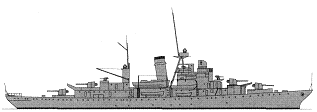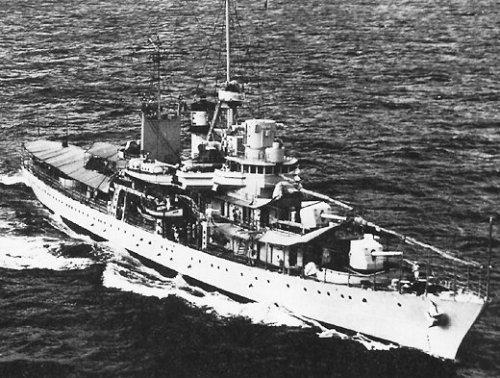

Erie 1941
| No | Name | Yard No | Builder | Laid down | Launched | Comm | Fate |
| PG50 | Erie | New York N Yd, Brooklyn | 12.1934 | 29.1.1936 | 7.1936 | beached 12.11.1942 | |
| PG51 | Charleston | Charleston N Yd | 10.1934 | 25.2.1936 | 7.1936 | for disposal 5.1946 |
|
Displacement standard, t |
2000 |
|
Displacement full, t |
2800 |
|
Length, m |
93.9 wl 100.1 oa |
|
Breadth, m |
12.6 |
|
Draught, m |
3.45 standard load |
|
No of shafts |
2 |
|
Machinery |
2 sets Parsons geared steam turbines, 2 Babcock & Wilcox boilers |
|
Power, h. p. |
6200 |
|
Max speed, kts |
20 |
|
Fuel, t |
oil 489 |
| Endurance, nm(kts) | 8000 (12) |
|
Armour, mm |
belt: 89, deck: 32 - 25, upper belt: 76 - 51, CT: 102 sides, 32 roof |
|
Armament |
4 x 1 - 152/47 Mk 17, 4 x 4 - 28/75 Mk 1, 1 seaplane (SOC) |
| Complement |
236 |
Project history: The appearance of two gunboats of Erie class was a result of London conference of 1930. The total document signed by all great world naval powers, allowed to built in any numbers the ships with less than 2000t standard displacement , speed not above 20kts and armed by up to 155mm guns. Having these characteristics for an orienting point, US designers started to design universal "sloop", called to solve wide range of tasks: from fire support of marines at landing operations (in 1930th interests of the USA in Caribbean basin frequently demanded an armed intervention) to convoy protection against surface raiders and submarines in wartime. Minelaying ability was provided also.
Hull of new gunboats (so new ships were classified) had unusual enough form with an oblong clipper bow (for decrease in influence of waves and splashes on fwd 152mm gun) and stern with a considerable overhang (for convenience of a minelaying and placing of anti-submarine armaments).
Main artillery consisted of four 152mm/47 guns in deck mounts placed on two in bow and stern. As to place in addition to 152mm also 127mm DP guns was impossible, Erie and Charleston became one of the first USN ships armed by 28mm MGs. It was possible to place even one seaplane which could be used for reconnaissance, and for gunfire correction. Seaplane can launch only from a water: there was no place for a catapult. Despite the modest dimensions new gunboats were well protected.
Though new gunboats as a whole were valued positive by naval chiefs, this class has not received the further development: for a peace time they were too expensive.
Ship protection: Main belt protecting machinery was 89mm thick. Fore magazines were protected by 73mm local upper belt and aft magazines were protected by 76-51mm ones.
Main deck connected with upper edge of main belt and was 32mm thick over machinery and 25mm over magazines.
Modernizations: 1942, both: - 4 x 4 - 28/75; + 6 x 1 - 20/70 Mk 4, 2 DCR
1.1946, PG51: 4 x 1 - 152/47 Mk 18, 6 x 1 - 20/70 Mk 10, 2 DCR, 1 seaplane
Naval service: Erie was torpedoed 12.11.1942 in Caribbean sea by German submarine U163, towed to harbour of Willemstad where she foundered 5.12.1942.

Erie
© Ivan Gogin, 2014-15